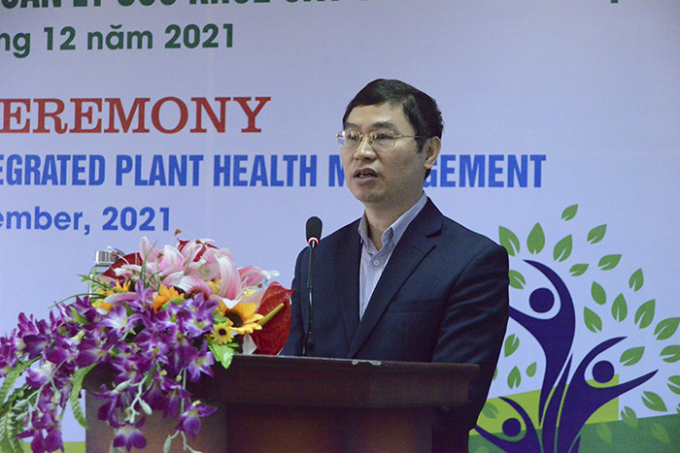May 19, 2025 | 01:49 GMT +7
May 19, 2025 | 01:49 GMT +7
Hotline: 0913.378.918
May 19, 2025 | 01:49 GMT +7
Hotline: 0913.378.918
On December 8th, the Department of Plant Protection (DPP) in collaboration with the FAO Office in Vietnam opened a national training course on integrated plant health management (IPHM).
According to the Department of Plant Protection, the training of trainers (TOT) course is part of the program “Development of integrated crop health management (IPHM) strategies and action plans” organized by the Food and Agriculture Organization of the United Nations (FAO) and approved by the Ministry of Agriculture and Rural Development of Vietnam (MARD). The Plant Protection Department was assigned the position of project manager.

Mr. Nguyen Quy Duong, DPP Deputy Director, making the opening speech for the training course. Photo: Trung Quan.
After the program kick-off workshop, the FAO consultants completed the report “Study on the development scope of the national strategy on plant health in Vietnam in the 2021 - 2030 period”. Experts from the FAO also constructed training materials for TOT-IPHM and planned to organize two TOT-IPHM courses in early 2022.
However, in order to successfully organize these two training courses, it is required to have trainers who possess a firm knowledge of IPHM.
The Department of Plant Protection therefore collaborated with the FAO Office in Vietnam to organize a training course for IPHM resource trainers. After this course the trainees will become the first IPHM trainers in Vietnam.
Mr. Nguyen Quy Duong, Deputy Director of the Plant Protection Department said, “Although Integrated Pest Management (IPM) plays a very important role in production, according to the latest statistics in 2021, the number of IPM trainers studied under DPP and FAO in provinces is seriously lacking. There are places with only 1-2 lecturers, there are even places without a TOT lecturer such as Son La, Lang Son, Lai Chau, Ha Giang, Gia Lai, Thua Thien - Hue.”
Faced with such an urgent situation, the Ministry of Agriculture and Rural Development issued a Decision which approves the documents for the program “Development of integrated crop health management (IPHM) strategies and action plans”. The program’s objective is to enhance food security, food safety and environmental sustainability through strengthening the capacity of the plant protection system.
The program will focus on researching and developing training programs as well as training materials for IPHM trainers, improving the ability of lecturers and related staff. Activities within the program will support the implementation of the national strategies and action plans on integrated crop health management. The two TOT-IPHM courses will be piloted, training 60 national lecturers to evaluate the aforementioned programs and materials.
The IPHM training program and materials will be developed accordingly for key trainers and plant protection officers and widen the knowledge of existing TOT-IPM trainers. Universities and colleges can at the same time add this to the training program for agricultural engineering students to build the IPHM staff force in the future.

After this course the trainees will become the first IPHM trainers in Vietnam. Photo: Trung Quan.
As stated by Mr. Nguyen Song Ha, Assistant FAO Representative (Programme) in Vietnam, during the process of implementing the national action plan on transforming the food system towards accountability, transparency and sustainability in Vietnam, the food system must address the challenges of poverty, malnutrition and sustainable development.
Vietnam's agricultural industry not only faces common challenges at the moment but also has to solve them at their root through transforming the way in which healthy food is produced, distributed and consumed.
From the end of 2020 to the beginning of 2021, FAO has adopted a global strategy of operations of which the Government of Vietnam is a member. The goal is that within the next 10 years food production will be transformed towards being more resilient to risks, sustainable, inclusive and leaving no one behind.
FAO also advocates promoting four pillars: Improvement of matters concerning nutrition - environment - production - human life around the world, especially farming households. In the 2022 - 2025 period FAO harbors the intention to prioritize the implementation of three sustainable development goals: reducing poverty, eliminating hunger and ensuring equity in food distribution.
The birth of the “Development of integrated crop health management (IPHM) strategies and action plans” program will help the plant protection system improve institutional capacity in service of IPM. IPM will have an upgrade into a new tool to heighten crop yield and quality, control risks and pests thanks to new technologies.
Mr. Ha also expressed his belief that the courses will consolidate knowledge and skills for future IPHM trainers, contributing to the transformation of Vietnam's food system.
Translated by Samuel Pham

(VAN) 14 out of 35 domesticated elephants in Dak Lak province have had their living conditions improved, with 11 of them currently participating in the non-riding elephant tourism model.

(VAN) Muong Nhe Nature Reserve hopes that being upgraded to a national park will lay the foundation for forest protection efforts to be carried out in a systematic, modern, and sustainable manner.
/2025/05/16/3923-2-171845_52.jpg)
(VAN) Lower costs, higher yields, and improved soil quality are outstanding benefits that soybeans bring when integrated into the crop rotation system.

(VAN) The 'For a Green National Environment' programme aims to promote a green lifestyle, support businesses in implementing ESG practices, and turn Net Zero commitments into concrete actions.

(VAN) Cold-barn systems efficiently manage environmental and temperature conditions, which aids in the prevention of respiratory diseases in pigs and protects them from the vectors that transmit African swine fevers.

(VAN) To tackle challenges, the project 'Addressing key technical bottlenecks in the grouper supply chain in Vietnam' has been underway since 2024.

(VAN) The project 'Disease-Resilient and Sustainable Cassava Production Systems in the Mekong Region', funded by the Australian Center for International Agricultural Research (ACIAR), is being implemented from 2024 to 2028.